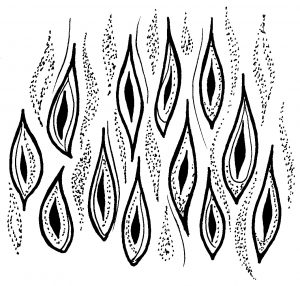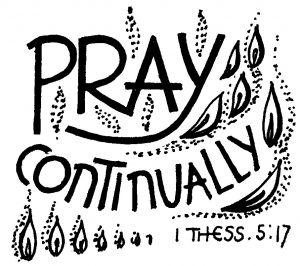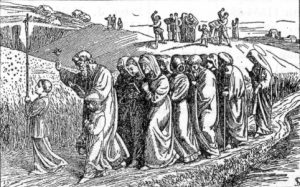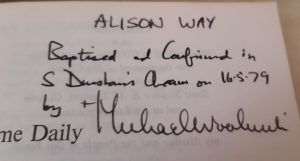Trinity Sunday
Romans 8: 12-17 and John 3: 1-17
Both the industries that I worked in before I retired were subject to regular inspections – in the bank we had inspectors who would descend without notice – carefully timing it so that they arrived just as we were about to close the doors to the public, and they would then stand behind each cashier as they balanced their till. In Adult Learning we were subject to Ofsted inspections – and with them you could receive advance warning that they were coming, although not always. In both cases, the inspectors were people who had done the jobs they were inspecting, and knew how it should be done, and all the tricks people might try to hide things that were not quite right.
Nicodemus is a good church person, he knows how things ought to be done according to the law. We are not told, and have no way of finding out why he came to talk with Jesus – or why he came by night. There are lots of possible reasons and we have considered several of them at various times. As a member of the ruling body of the temple in Jerusalem, he could almost have been sent to check that Jesus is doing things properly. We often meet Jesus talking with church leaders – they know the proper way to do things. Even the disciples at times try to put Jesus straight, and we read that Peter is caught out in the days of the early church trying to return to doing things ‘properly’ rather than being guided by the spirit.
Despite his very courteous opening of the discussion, Jesus tells Nicodemus from the outset that he has no way of knowing what God is like – God doesn’t fit into a proper procedure. Nicodemus has started the conversation with a compliment, ‘Nobody could do the things that you do unless God was with him’ which Jesus throws straight back at him – effectively saying ‘how would you know that? Only people who have been born again can know about God’. Sadly, in recent years, the description ‘born again Christian’ has become somewhat debased currency. We associate it with people who shout long sermons at Speakers Corner, or go from door to door with tracts asking people if they have been saved. And yet the need to be born again came straight from Jesus, and if we are ever tempted to say that the description ‘born again Christian’ does not apply to us, then we need to come back to this passage in John 3 and remember what Jesus said.
At a recent PCC meeting, Alison asked us all what we were most hoping for, for the future. There was a variety of answers, but the one that most people agreed on was that they wanted things to return to normal. I am sure that every one of us had a different picture in our heads of what normal looked like, but even so, I don’t think that is going to happen.
I believe that just as He was when Jesus came to earth, God is doing a new thing with us now. I wish I could give you some idea what that was, but I have no more knowledge than you – it will be something exciting and maybe scary at times. I believe that things here will be changing and our faith may be tested. I don’t know how yet, and it may be uncomfortable. As the Queen said in a recent broadcast, has been a bumpy ride for some of us – and there may be more bumps to come but God is still in charge.
I was recently reminded that you cannot have a flower without the bud breaking, a chick cannot hatch without smashing through its comfortable and protective shell, and I was told that unless a butterfly or moth has to struggle to escape the chrysalis, it won’t be able to fly. As the old saying goes, you can’t make an omelette without breaking eggs. The past year has put stresses on members of our clergy that they were not trained to cope with. Asked them time after time to complete tasks that have never been on the theological college curriculum. I doubt if you will ever hear a would-be ordinand telling a selection conference that they feel convinced that God is calling them, to use their skills in risk assessment and making the best use of Zoom. I don’t know what Alison was asked about when she was interviewed before coming here, but I doubt very much if it was about her experience in infection control and video editing. I wonder if Jesus considered assessing the risk before riding into Jerusalem? I should say at this point that I do see the wisdom in assessing the risks at a time like this has been.
Nicodemus could have been checking that Jesus is doing his signs in accordance to the approved guidelines of the Temple authorities, and it is no wonder that he finds it hard to understand what Jesus tells him, because Jesus has come to teach that God is doing a new thing and if we in Wincanton and Pen Selwood go back to doing what we have always done, I would venture to suggest that it will have the same effect on the town and village that it has always had.
The story of Nicodemus is one that John uses to get over some important truths to us as well as to the Jewish authorities. Throughout the conversation, Jesus is gently playing with words that can be understood more than one way – he talks of being born ‘again’, or equally ‘from above’ and in the next verse talks about the effect of the wind or spirit – in both cases the words are interchangeable. Just as we can see and feel the effect of the wind, so too we can see the work of the Holy Spirit, and the only clue we get about the future is that the Spirit goes where it wills, and we will see the effects.
I once promised some of you that although I could not promise never to quote C S Lewis in a sermon, I was unlikely to quote from a book about Narnia, but I am going to break that promise now. In ‘The Lion, The Witch and the Wardrobe’ there is an occasion when Aslan plays with Susan and Lucy. Speaking of this time of play Lucy later says she can never make up her mind whether it was more like playing with a kitten or a thunderstorm. Perhaps that is what life would be like if we allowed the Spirit to blow where she wills. Up until now, our tactics have been to meet inside these four walls, and hope that invitations and the occasional special service will encourage people to join us. Lots of people have been here on special occasions: – at Christmas, Remembrance and Harvest, and especially for school services and baptisms, but very few of them seem to have found anything that seems to inspire them to come again. Could it be that we are hiding God in a building? I have often thought that we are good at getting caught in in-between spaces – I think the fashionable word at the moment is liminal space. Could we be stuck between Ascension and Pentecost? That we have seen Jesus return to his father, but have not yet fully embraced the inspiration and power of the Spirit? We read last week what the effect of that was on the apostles! At the end of the recorded version of last Sunday’s worship, Alison used the words of Commitment for Pentecost – several questions which each begin with the words ‘Will you dare…’ and to each the response is ‘We will’. I do recommend that you look at this if you have not seen it, and look at it again if you have. Within this section of the service are the words ‘Today we have remembered the coming of God’s power on the disciples and we invite that same Spirit to drive us out into the wild places of the world.’ You could say that the strength of the wind last Sunday turned Pen Selwood itself into one of the wild places of the world, but on a more serious note, I wonder how keen any of us really is to go into wild and possibly dangerous places trusting in the Spirit’s protection. I wonder if we have become too comfortable where we are?
We do know that Nicodemus did not go away disappointed by his conversation with Jesus, because he occurs again by name in the Gospels when as a friend of Joseph of Arimathea, he goes with him to request permission to bury Jesus body after his crucifixion. That was venturing into a wild and dangerous place, and would have set him against both the Roman and the Temple authorities. Perhaps one reason he had the courage to do this was because he was one of the first people to hear Jesus summing up of God’s amazing plan for the redemption of the world in verse 16 – surely one of the best-known verses in the whole of the Bible. We also, perhaps, have a clue as to why the story of his talk with Jesus occurs at night. When Nicodemus came to Jesus he was in the dark, but surely he left in the light. We have the privilege of meeting with Jesus too – do we dare to take his light with us when we leave?
Link to Sunday’s video reflection is: https://youtu.be/A3IOpb3aDfU




